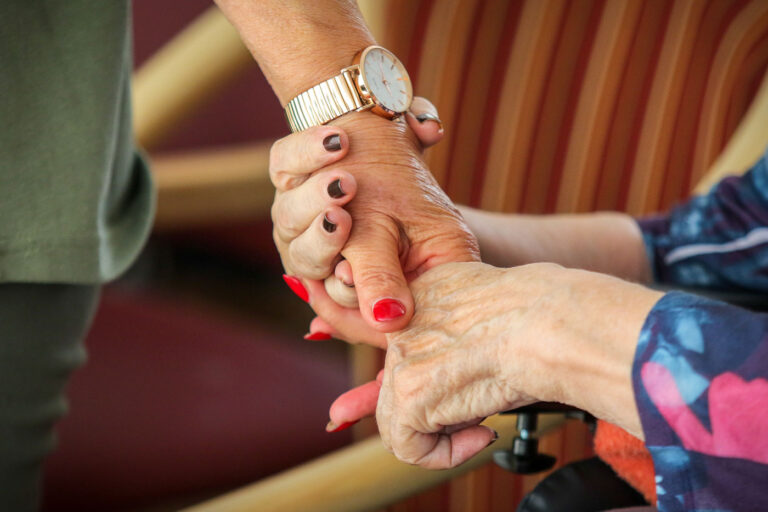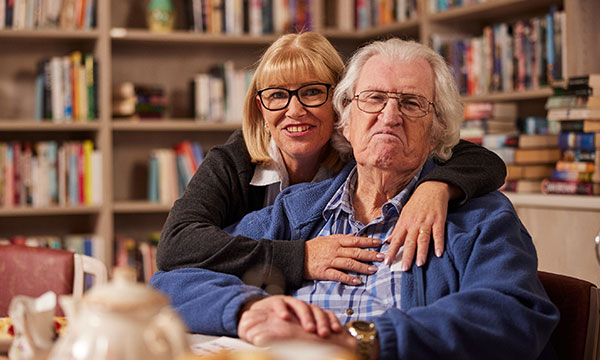10 benefits of leisure and lifestyle activities in aged care
Learn how lifestyle activities in aged care support residents to live life to their full potential and discover some of the popular activities available.

A healthy and active lifestyle is important no matter what your age – and it becomes even more important as we get older. One of the benefits of a residential aged care centre is that it provides seniors with regular access to appropriate lifestyle activities that support living life to their full potential.
These purposeful activities for older adults are part of broader aged care enrichment programs aimed at promoting independence in seniors and enhancing overall wellbeing.
Why Leisure and Lifestyle Activities Matter in Aged Care
1. Leisure activities support and improve senior health and wellbeing
Leisure activities offer numerous important benefits for aged care residents and are not just a nice-to-have – they’re a key part of wellbeing and help promote a healthy lifestyle.
Gentle exercise, for example, is really important for maintaining good physical health, especially for seniors. Lifestyle activities also have the potential to drastically improve resident wellbeing and mental health outcomes by providing a sense of purpose, friendship and community.
Instead of living alone with minimal social interaction, you have access to regular social activities that help reduce isolation and increase connection, providing necessary social inclusion for aged care residents.
2. Your needs and desires come first
Sometimes we fall into the unhelpful (and incorrect) trap of treating older people as one homogenous group, but at an aged care centre each senior is treated as the unique individual that they are, with unique preferences and needs. Beyond assessing cognitive ability and physical mobility, a good aged care centre will also seek to fully understand each resident’s upbringing, personality, likes, dislikes, religious beliefs and cultural background as well as the activities they used to enjoy.
From this place of deeper understanding, a tailored lifestyle program that's part of a personalised care plan can be developed that aims to meet their needs, preferences and goals. For example, if someone loves animals, then pet therapy could bring a lot of joy, but if they don’t, a dog could actually cause distress. Just as no two individuals are alike, neither is the lifestyle program that is developed to serve their needs. What’s more, this individual program is incorporated into their overall care plan to ensure these needs are consistently met and a high quality of life in residential care is achieved.
3. There are many fun activities for aged care residents to enjoy
Once there is an understanding of the individual and suggested program, residents can choose from a range of different meaningful activities and decide how they wish to engage with that activity. Some seniors will prefer to do individual activities in the privacy of their own room, such as crosswords or reading, while others will get more from group activities such as bingo, armchair travel or group exercise.
By offering choice aged care staff are better able to cater to individual needs and desires. At IRT, for example, if a resident has a particular cultural background, they may be asked if they would like to celebrate their national day or enjoy a visit from a volunteer who speaks their first language. This provides a great opportunity to honour identity and support aged care community connections.
4. Accessible & inclusive aged care activities adapt to you
A good lifestyle program will consider a senior’s cognitive and physical abilities, without ruling out participation too quickly. Sometimes there’s a way to modify an activity to compensate for lost abilities. For example, if someone at bingo has poor eyesight, staff may create a bigger card, or offer a support person to make playing easier. Perhaps another more able resident might even volunteer to assist. Creative solutions allow people to participate in the activities they enjoy, which also has the added benefit of helping create a sense of empowerment.


5. Active support and encouragement in aged care builds confidence
After so many years living at home, the move to an aged care home can be a bit overwhelming but there’s also a lot of additional support. Some residents may have lost some of their confidence, especially if they had a recent fall that has dampened their self-assurance. A little bit of encouragement to stay active in small ways and celebration of the wins, no matter how small, can go a long way in helping a senior to feel supported and capable of participating, not to mention welcome. Supportive and encouraging aged care workers can truly make a difference in the lives of older people in this way.
6. Your safety is always considered
At an aged care centre, safety is always paramount, but ensuring residents feel safe, physically and emotionally, also boosts participation in lifestyle activities. As with any type of care, staff provide comfort and emotional support and listen for any concerns. They will also monitor residents for changes in behaviour, isolation or signs that they might need additional support, including residents living with dementia. This may be missed altogether when they are living alone or only have occasional outside help.
7. You stay engaged with the community
Getting older can be isolating for many residents, especially with decreased mobility, but it’s healthy to remain engaged with the outside community. Bus outings for groups are a wonderful activity, but often a lifestyle program can also include a volunteer taking an individual resident to their local church or bowling club so they may continue to do things they enjoy and value. If mobility or a medical issue prevents someone from leaving the aged care centre, there are also opportunities to bring the outside community to them. For example, at IRT our lifestyle program might connect residents with local primary school children to exchange letters and artwork and sometimes children visit the centre for a special event.
Read about the top 12 mental health benefits of exercise
8. Make new friends through social aged care activities
As with any stage of life, meaningful relationships are imperative to ensuring a high quality of life in residential aged care. Lifestyle activities at an aged care centre provide ideal opportunities to connect with other residents and staff through shared activities and social events. It's the perfect way to meet other people in a relaxed setting and have a chat or share stories and laughter while doing something fun. Residents can join a book club, engage in art classes, or teach others their skills to build aged care community connections.
9. Build strength and confidence through movement
Gentle daily exercise plays a vital role in supporting the health and wellbeing of aged care residents. Regular movement helps improve balance, coordination, and muscle strength, which are essential for maintaining independence and mobility. By strengthening key muscle groups and enhancing stability, these exercises significantly reduce the risk of falls, a common concern in older adults. As residents build physical confidence through consistent, low-impact activity, they often experience a boost in self-esteem and a greater sense of security in their daily movements.
These are great examples of mobility-friendly activities and are key to encouraging physical activity in aged care.
10. Provides purpose and reduces isolation and boredom
Lifestyle activities in aged care play a vital role in providing structure to residents’ days, creating a sense of rhythm and purpose that can be deeply reassuring. These activities help reduce feelings of isolation and boredom by offering regular opportunities for social interaction, mental stimulation and physical engagement. Whether it’s a morning walk, an afternoon craft session, or a group game, consistent lifestyle activities support emotional wellbeing, foster a sense of community and give residents something to look forward to, enhancing their overall quality of life in residential care.

Does your loved one need support?
IRT has been supporting older Australians and their families with compassionate care for more than 50 years with aged care centres in NSW, Qld and the ACT. If your loved one needs warm and personalised care you can trust, we'd be more than happy to help.
Find out morePopular Aged Care Lifestyle Activities
Lifestyle activities in aged care are important for maintaining health and wellbeing and can help alleviate isolation and depression in older people. There are numerous options to encourage socialising, friendship and a sense of purpose, but here are 8 enjoyable lifestyle activities to look out for when considering an aged care centre.
Mentally Stimulating Activities for Aged Care Residents
Arts and crafts
Art and craft activities are highly beneficial for improving mental health as they allow older people to focus on the present moment. There’s also a lot of flexibility with what can be done, whether it’s painting or drawing, knitting or pottery.
Individual activities
Many people, regardless of age, are not interested in group activities. It is therefore crucial to provide opportunities for entertainment and connection that happens alone or 1:1. This could include puzzles, beauty therapy, massage, music therapy, reading, watching a movie, making art and craft or pet therapy.
Bingo
An oldie but a goodie. Bingo is a bit of a stereotype but it does work! It provides light-hearted entertainment and can easily be run in a variety of settings as it doesn’t require much space, equipment or skill.
Social and Community-Building Activities for the Aged
Social outings
Many aged care centres have a community bus which is perfect for organising group outings to places in the community. Getting out and about is highly beneficial and provides older people with the opportunity to reconnect with the community, visit natural surroundings or enjoy a meal somewhere different. It can be very refreshing and help reduce aged care cabin fever.
Social outings
Many aged care centres have a community bus which is perfect for organising group outings to places in the community. Getting out and about is highly beneficial and provides older people with the opportunity to reconnect with the community, visit natural surroundings or enjoy a meal somewhere different. It can be very refreshing and help reduce aged care cabin fever.
Individual activities
Many people, regardless of age, are not interested in group activities. It is therefore crucial to provide opportunities for entertainment and connection that happens alone or 1:1. This could include puzzles, beauty therapy, massage, music therapy, reading, watching a movie, making art and craft or pet therapy.
Arts and crafts
Art and craft activities are highly beneficial for improving mental health as they allow older people to focus on the present moment. There’s also a lot of flexibility with what can be done, whether it’s painting or drawing, knitting or pottery.

Pet therapy
For older people who love animals, a visit from a furry friend can really brighten their day. Pets provide companionship and can inject playfulness and lightness wherever they go. Just make sure animals are well-supervised and have their nails clipped short to avoid health and safety issues.
Physical Activities in Aged Care to Promote Health and Wellbeing
Dance
Dancing is another wonderful activity for lifting the spirits and can be modified to suit varying levels of mobility. Chair dancing, for example, is a great way to make it accessible for seniors. Dance also offers physical exercise, which is particularly important to maintain with age.
Group exercise
Exercise is a fundamental component of healthy living, and it becomes even more important with age as exercise triggers the body’s natural repair process. Naturally the exercise planned needs to be gentle and take into account specific needs and restrictions. Chair exercise, carpet bowls, walking, yoga for seniors or tai chi are some good activities to try.
Theme days
Whether it’s Mother’s Day, ANZAC Day or Italian Day, theme days are a great excuse to inject meaning and/or celebration into the lives of residents.
The theme could be culturally inspired based on a resident’s ethnic background or based on calendar events such as Father’s Day and the Melbourne Cup. They offer an opportunity for residents to honour their history, culture and identity. Plus, they are also often a great excuse to connect more with family and to enjoy a bit of fun. For example, a crazy hair day with staff and residents donning wigs and rainbow-coloured hair is sure to brighten up everybody’s day.


Your feedback is highly valued
As with any type of service, feedback on what’s working and what isn’t is invaluable. A good aged care centre will conduct regular surveys to determine how the lifestyle program can be improved. They will also conduct regular meetings and use feedback to ensure the program is tailored to meet every resident's needs.
Informal feedback is also useful – staff might speak directly to residents and family members or check in during an activity to see if residents like what they are doing. Observation can also be helpful – lots of genuine smiles is a positive sign, and while looks of distress or boredom can indicate an ineffective activity, perhaps there’s a way to modify it. Either way, a good aged care centre will get your feedback, evaluate the program and develop an action plan to improve it.

Find your perfect role with IRT
Looking to make a meaningful difference in the lives of older Australians? Explore career opportunities with IRT Aged Care Centres in NSW, QLD, and the ACT, where you can be part of a team dedicated to providing compassionate and personalised care.
Find my ideal jobFAQs
What is active support in aged care?
Active support is a person-centred approach used in aged care to encourage and enable residents to take part in everyday activities to the best of their ability. Rather than doing tasks for residents, care staff work with them—providing just the right amount of assistance to help individuals stay involved and maintain their independence. This method promotes dignity, choice, and engagement, helping residents feel more in control of their lives and boosting their overall wellbeing.
How important are activities in an aged care setting?
Activities are essential in aged care as they provide structure, purpose and joy in residents’ lives. Beyond entertainment, well-planned activities support cognitive function, physical health, emotional wellbeing and social connection. They help prevent feelings of isolation or boredom and can even reduce symptoms of depression or anxiety. Activities tailored to individual interests and abilities also foster a sense of identity and belonging within the community.
How to help aged care residents be more active?
To encourage more activity, start by understanding each resident’s preferences, abilities, and goals. Offer a variety of gentle physical, cognitive, and social activities to cater to different interests. Incorporate movement into daily routines—like gardening, light cleaning, or walking to meals—and create a safe, supportive environment that builds confidence. Positive reinforcement, social encouragement, and making activities fun and meaningful all help boost participation and motivation.
What are some daily living activities for aged care?
Daily living activities in aged care include essential tasks such as bathing, dressing, grooming, eating, and toileting. However, they also extend to domestic tasks like setting the table, folding laundry, or watering plants. Encouraging residents to take part in these everyday activities, with support where needed, helps maintain their independence, mobility, and sense of purpose.
What are easy group activities for seniors?
Easy group activities for seniors include chair yoga, arts and crafts, music sing-alongs, bingo, memory games, and group storytelling. These activities are inclusive, adaptable, and support social interaction. Walking groups, group gardening, or even simple cooking sessions like making scones together can be engaging and enjoyable ways to foster connection while gently encouraging movement and cognitive stimulation.
What activities do elderly enjoy?
Elderly individuals often enjoy activities that are familiar, meaningful, and suited to their physical and cognitive abilities. This might include listening to music, doing puzzles, reminiscing, light gardening, arts and crafts, reading, gentle exercise, or spending time with pets. Social activities like group games, conversations over tea, or celebrating birthdays and cultural events also bring joy and foster community connection.
Subscribe to our newsletter
You may also like
Art as therapy in aged care: what you need to know
Here we explore the role of art as therapy in residential aged care, particularly for those living with dementia.
Pet Therapy in Aged Care: How Animal Companionship Improves Wellbeing
You’ve most likely heard the saying “dogs are a man’s best friend,” but dogs and other pets alike can often do much more for a…


